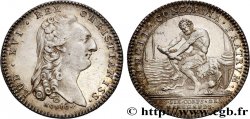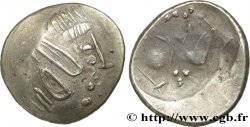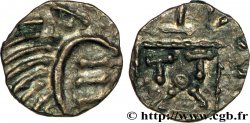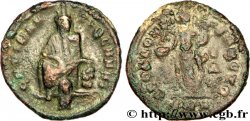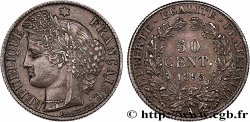Back 1/1
fjt_129263 - CORPORATIONS Jeton Ar 30, marchands épiciers-apothicaires 1710
Not available.
Item sold on our e-shop (2017)
Price : 320.00 €
Item sold on our e-shop (2017)
Price : 320.00 €
Type : Jeton Ar 30, marchands épiciers-apothicaires
Date: 1710
Metal : silver
Diameter : 30,5 mm
Orientation dies : 6 h.
Weight : 8,41 g.
Rarity : R2
Catalogue references :
Obverse
Obverse legend : LUDOVICUS. - MAGNUS REX..
Obverse description : Buste de Louis XIV à droite, signé TB en monogramme, type Guéant Prieur 470K.
Obverse translation : Louis le Grand, Roi.
Reverse
Reverse legend : LANCES ET PONDERA SERVANT. ; À L'EXERGUE : MARCDS. EPICIERS. ET. APOTIQUAIRES. .1710..
Reverse description : Écu représentant une main tenant une balance au-dessus de deux navires voguant vers la gauche.
Reverse translation : Ils ont la garde des poids et des balances.
Commentary
Les deux navires rappellent l’appartenance des épiciers et apothicaires au deuxième corps des marchands. ce jeton fait partie de la série des corporations.
Le principal objet de leur commerce était la vente en gros et au détail de toutes les épices et de toutes les drogues simples qui s'emploient dans les aliments, dans la médecine et dans les arts.
The two ships recall the membership of grocers and apothecaries in the second body of merchants. This token is part of the series of corporations. The main object of their trade was the wholesale and retail sale of all spices and all simple drugs used in food, medicine and the arts.
Le principal objet de leur commerce était la vente en gros et au détail de toutes les épices et de toutes les drogues simples qui s'emploient dans les aliments, dans la médecine et dans les arts.
The two ships recall the membership of grocers and apothecaries in the second body of merchants. This token is part of the series of corporations. The main object of their trade was the wholesale and retail sale of all spices and all simple drugs used in food, medicine and the arts.








 Report a mistake
Report a mistake Print the page
Print the page Share my selection
Share my selection Ask a question
Ask a question Consign / sell
Consign / sell
 Full data
Full data

